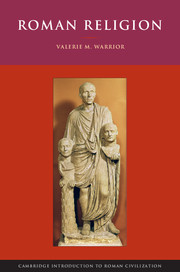Book contents
- Frontmatter
- Contents
- List of Illustrations and Maps
- Preface
- Acknowledgments
- 1 The Gods and their Worship
- 2 Divination, Prayer, and Sacrifice
- 3 Religion and the Family
- 4 Religion and the State
- 5 Religion and War
- 6 The Calendar, Festivals, and Games
- 7 Official Attitudes toward Foreign Cults
- 8 Magic and the Occult
- 9 Becoming a God
- 10 The Jews and Christianity
- Chronology
- Maps
- Gods
- Glossary
- Ancient Sources
- Bibliography
- Illustration Credits
- Index
5 - Religion and War
Published online by Cambridge University Press: 05 February 2015
- Frontmatter
- Contents
- List of Illustrations and Maps
- Preface
- Acknowledgments
- 1 The Gods and their Worship
- 2 Divination, Prayer, and Sacrifice
- 3 Religion and the Family
- 4 Religion and the State
- 5 Religion and War
- 6 The Calendar, Festivals, and Games
- 7 Official Attitudes toward Foreign Cults
- 8 Magic and the Occult
- 9 Becoming a God
- 10 The Jews and Christianity
- Chronology
- Maps
- Gods
- Glossary
- Ancient Sources
- Bibliography
- Illustration Credits
- Index
Summary
It will be apparent that the Romans made the beginnings of their wars and their motives for war in accordance with the utmost piety. And it was for this reason in particular that they had the gods on their side in times of danger.
(Dionysius of Halicarnassus, Antiquities 2.72)We owe the creation, increase, and retention of our empire (imperium) to the will of the gods…. We have excelled every race and nation in piety (pietas), in respect for religious matters (religio), and in that singular wisdom which recognizes that everything is ruled and controlled by the will of the gods.
(Cicero, On the Reply of the Haruspices 19)As we saw in the previous chapter, the Greek historian Polybius (6.56) observed that the Romans' awe of the supernatural (deisidaimonia) held the state together. Dionysius of Halicarnassus, another Greek historian, remarks on the effectiveness of Roman piety in the initiation of wars. Cicero notes that the Romans owed their empire to their piety (pietas), a proper respect for religious matters (religio), and a recognition of the omnipotence of the gods' will. The basic concept of the Greek eusebeia and the Latin pietas is the dutiful and correct performance of the gods' worship. Nowhere in the surviving testimony is the Roman insistence on such piety better seen than in the conduct of their wars.
- Type
- Chapter
- Information
- Roman Religion , pp. 55 - 66Publisher: Cambridge University PressPrint publication year: 2006



